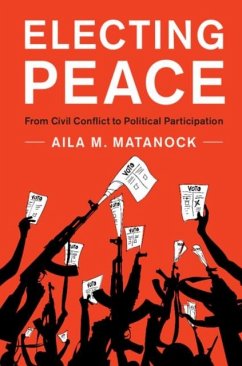Settlements to civil conflict, which are notably difficult to secure, sometimes contain clauses enabling the combatant sides to participate as political parties in post-conflict elections. In Electing Peace, Aila M. Matanock presents a theory that explains both the causes and the consequences of these provisions. Matanock draws on new worldwide cross-national data on electoral participation provisions, case studies in Central America, and interviews with representatives of all sides of the conflicts. She shows that electoral participation provisions, non-existent during the Cold War, are now in almost half of all peace agreements. Moreover, she demonstrates that these provisions are associated with an increase in the chance that peace will endure, potentially contributing to a global decline in civil conflict, a result which challenges prevailing pessimism about post-conflict elections. Matanock's theory and evidence also suggest a broader conception of international intervention than currently exists, identifying how these inclusive elections can enable external enforcement mechanisms and provide an alternative to military coercion by peacekeeping troops in many cases.
Dieser Download kann aus rechtlichen Gründen nur mit Rechnungsadresse in A, B, BG, CY, CZ, D, DK, EW, E, FIN, F, GR, HR, H, IRL, I, LT, L, LR, M, NL, PL, P, R, S, SLO, SK ausgeliefert werden.


